Surdas ke Pad Class 10 Hindi Chapter 1 | Full Explanation & Meaning
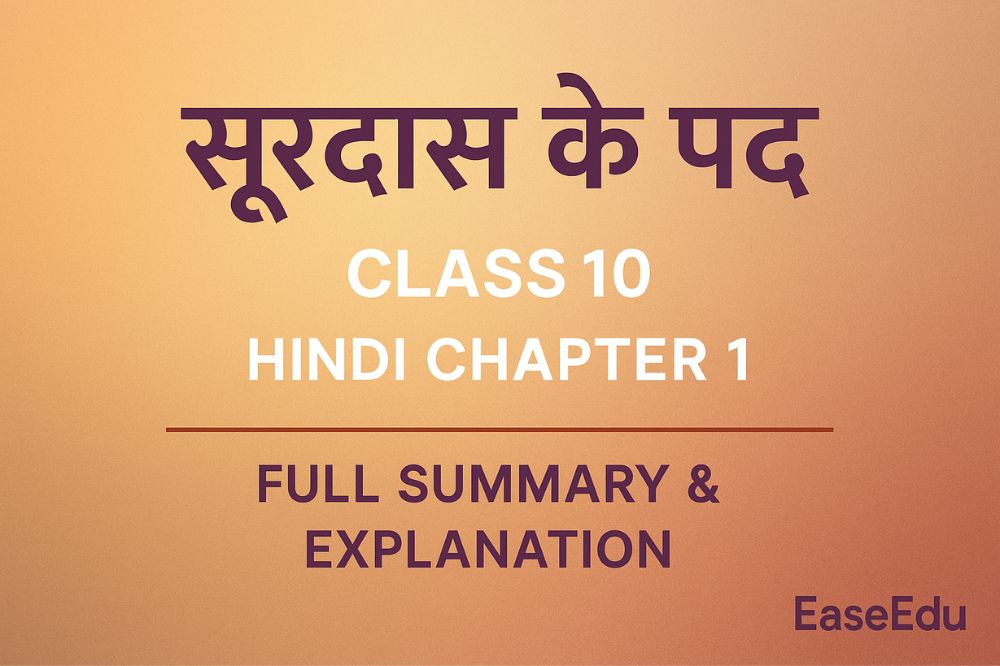
Presented by EaseEdu – Where Learning Meets Emotion | madhav Joshi Chapter Overview | Surdas ke Pad Class 10 Hindi Chapter 1 पाठ का नाम: सूरदास के पद कवि: सूरदास संग्रह: सूरसागर (भ्रमरगीत खंड) युग: भक्ति काल – सगुण भक्ति शाखा भाषा: ब्रज भाषा रस: श्रृंगार, भक्ति, विरह भाव और प्रसंग की गहराई इस अध्याय में चार पद हैं, जो गोपियों और उद्धव के बीच संवाद के रूप में रचे गए हैं। श्रीकृष्ण ने मथुरा जाने के बाद उद्धव को योग और ज्ञान का संदेश देकर गोपियों को समझाने भेजा। लेकिन गोपियाँ प्रेम और भक्ति के मार्ग को श्रेष्ठ मानती हैं और उद्धव की बातों को व्यंग्य और तर्क से खारिज कर देती हैं। सूरदास के भ्रमरगीत के पद पाठ व्याख्या (Surdas ke Pad Class 10 Hindi Chapter 1 ) पहला पद ऊधौ , तुम हौ अति बड़भागी । अपरस रहत सनेह तगा तैं , नाहिन मन अनुरागी । पुरइनि पात रहत जल भीतर , ता रस देह न दागी । ज्यौं जल माहँ तेल की गागरि , बूँद न ताकौं लागी । प्रीति – नदी मैं पाउँ न बोरयौ , दृष्टि न रूप परागी । ‘ सूरदास ‘ अबला हम भोरी , गुर चाँटी ज्यौं पागी || पद की पंक्तियाँ और भावार्थ: “ऊधौ, तुम हौ अति बड़भागी” गोपियाँ कहती हैं—ऊधौ! तुम बहुत भाग्यशाली हो। भावार्थ: तुम श्रीकृष्ण के इतने निकट रहते हो, फिर भी उनके प्रेम में नहीं डूबे। यह तुम्हारा सौभाग्य है या दुर्भाग्य—हम नहीं कह सकते। “अपरस रहत सनेह तगा तैं, नाहिन मन अनुरागी” तुम प्रेम के धागे से अछूते रहे, तुम्हारे मन में अनुराग नहीं है। भावार्थ: तुम्हारा हृदय प्रेम से रहित है। तुम श्रीकृष्ण के साथ रहते हुए भी उनके प्रेम को नहीं समझ सके। “पुरइनि पात रहत जल भीतर, ता रस देह न दागी” कमल का पत्ता पानी में रहता है, फिर भी गीला नहीं होता। भावार्थ: तुम भी श्रीकृष्ण के प्रेम-सागर में रहते हुए भी उसमें डूबे नहीं। जैसे कमल का पत्ता जल में रहकर भी जल को ग्रहण नहीं करता। “ज्यौं जल माहँ तेल की गागरि, बूँद न ताकौं लागी” जैसे तेल से सना घड़ा पानी में डूबे, फिर भी पानी की एक बूंद भी उस पर नहीं टिकती। भावार्थ: तुम्हारा मन इतना कठोर है कि श्रीकृष्ण के प्रेम की एक बूंद भी उसमें नहीं ठहर सकी। “प्रीति – नदी मैं पाउँ न बोरयौ, दृष्टि न रूप परागी” तुमने प्रेम की नदी में पैर तक नहीं डुबोया, न ही श्रीकृष्ण के रूप में खोए। भावार्थ: तुमने न प्रेम को अपनाया, न श्रीकृष्ण के सौंदर्य में लीन हुए। तुम्हारा मन योग में उलझा रहा। “‘सूरदास’ अबला हम भोरी, गुर चाँटी ज्यौं पागी” हम भोली-भाली गोपियाँ तो श्रीकृष्ण के प्रेम में ऐसे लिप्त हैं जैसे चींटी गुड़ में चिपक जाती है। भावार्थ: हम तो पूरी तरह कृष्ण-प्रेम में डूब चुकी हैं। हमारा प्रेम गहरा, सच्चा और आत्मसमर्पण से भरा है। काव्य सौंदर्य और विशेषताएँ: तत्व विवरण भाषा ब्रज भाषा – भावपूर्ण और व्यंग्यात्मक अलंकार उपमा (कमल पत्ता, तेल घड़ा), रूपक, व्यंग्य भाव कृष्ण-वियोग, प्रेम की गहराई, योग का तिरस्कार शैली संवादात्मक, भावनात्मक, व्यंग्यात्मक CBSE Class 10 SST Syllabus 2025-26 दूसरा पद मन की मन ही माँझ रही । कहिए जाइ कौन पै ऊधौ , नाहीं परत कही । अवधि अधार आस आवन की , तन मन बिथा सही । अब इन जोग सँदेसनि सुनि – सुनि , बिरहिनि बिरह दही । चाहति हुतीं गुहारि जितहिं तैं , उत तैं धार बही । ‘ सूरदास ’ अब धीर धरहिं क्यौं , मरजादा न लही । पंक्ति-दर-पंक्ति भावार्थ और व्याख्या: “मन की मन ही माँझ रही” हमारे मन की बात हमारे मन में ही रह गई। भावार्थ: गोपियाँ कहती हैं कि वे श्रीकृष्ण से जो कहना चाहती थीं, वह कभी कह नहीं सकीं। उनके प्रेम और पीड़ा को कोई समझ नहीं पाया। “कहिए जाइ कौन पै ऊधौ, नाहीं परत कही” अब बताओ ऊधौ, किससे जाकर कहें? कोई समझ ही नहीं पाता। भावार्थ: गोपियाँ अपनी व्यथा किसी से साझा नहीं कर सकतीं क्योंकि कोई उनके प्रेम की गहराई को समझने योग्य नहीं है। “अवधि अधार आस आवन की, तन मन बिथा सही” कृष्ण के लौटने की आशा में समय बीतता गया, और हमने तन-मन की पीड़ा सह ली। भावार्थ: गोपियाँ श्रीकृष्ण के आने की उम्मीद में जीती रहीं, लेकिन वह आशा अधूरी रह गई। उन्होंने वियोग की पीड़ा को सहा। “अब इन जोग सँदेसनि सुनि – सुनि, बिरहिनि बिरह दही” अब बार-बार योग के संदेश सुनकर वियोगिनी गोपियाँ जल रही हैं। भावार्थ: गोपियाँ कहती हैं कि उद्धव के योग-संदेश उनके घावों पर नमक छिड़कने जैसा है। वे पहले ही वियोग में जल रही थीं, अब ये बातें उन्हें और दुखी कर रही हैं। “चाहति हुतीं गुहारि जितहिं तैं, उत तैं धार बही” जहाँ वे श्रीकृष्ण से रक्षा की गुहार करना चाहती थीं, वहीं से अब आँसू की धार बह रही है। भावार्थ: गोपियाँ श्रीकृष्ण से प्रेम और सहारा चाहती थीं, लेकिन अब उनकी आँखों से केवल आँसू बहते हैं। कृष्ण ने उन्हें छोड़ दिया। “‘सूरदास’ अब धीर धरहिं क्यौं, मरजादा न लही” अब सूरदास कहते हैं—गोपियाँ धैर्य कैसे रखें, जब उन्हें प्रेम की मर्यादा भी नहीं मिली। भावार्थ: गोपियाँ कहती हैं कि जब प्रेम में उन्हें सम्मान या उत्तर नहीं मिला, तो वे धैर्य कैसे रखें? उनका प्रेम एकतरफा और उपेक्षित रह गया। काव्य सौंदर्य और विशेषताएँ: तत्व विवरण भाषा ब्रज भाषा – भावपूर्ण और व्यंग्यात्मक अलंकार रूपक, अनुप्रास, व्यंग्य भाव कृष्ण-वियोग, प्रेम की पीड़ा, योग का तिरस्कार शैली संवादात्मक, भावनात्मक, तर्कपूर्ण तीसरा पद हमारैं हरि हारिल की लकरी । मन क्रम बचन नंद – नंदन उर , यह दृढ़ करि पकरी । जागत सोवत स्वप्न दिवस – निसि , कान्ह – कान्ह जक री । सुनत जोग लागत है ऐसौ , ज्यौं करुई ककरी । सु तौ ब्याधि हमकौं लै आए , देखी सुनी न करी । यह तौ ‘ सूर ’ तिनहिं लै सौंपौ , जिनके मन चकरी ।। पंक्ति-दर-पंक्ति भावार्थ और व्याख्या: “हमारैं हरि हारिल की लकरी” हमारे श्रीकृष्ण हारिल पक्षी की लकड़ी जैसे हैं। भावार्थ: गोपियाँ कहती हैं कि उनका प्रेम श्रीकृष्ण के लिए ऐसा है जैसे हारिल पक्षी लकड़ी को पकड़ता है—एक बार पकड़ने के बाद उसे कभी नहीं छोड़ता। उनका
What Is Education and Why Is It Important?
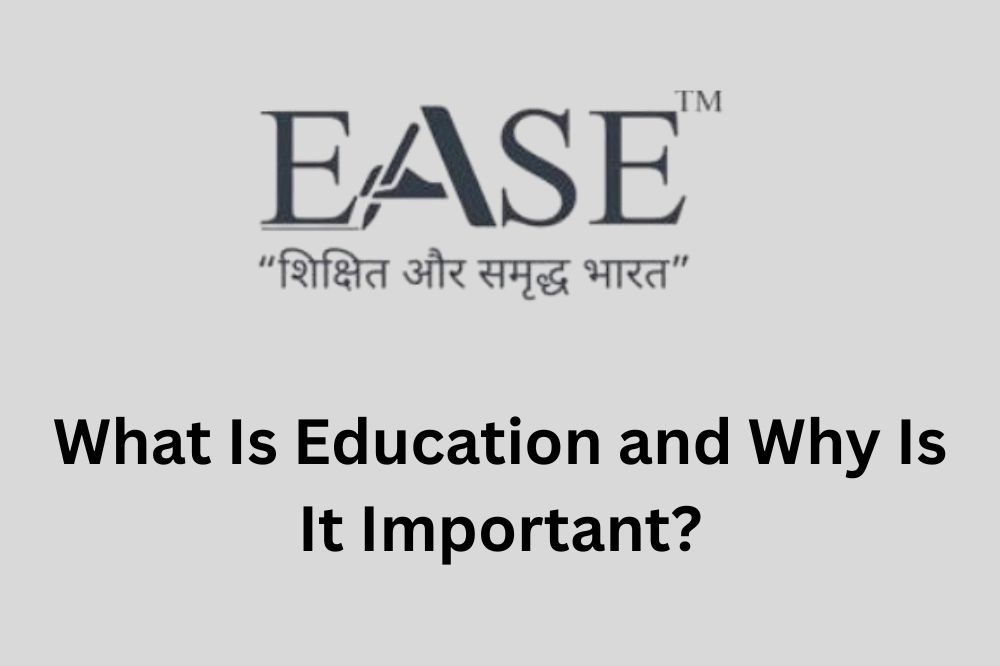
In a world driven by technology, competition, and constant change, education is no longer a luxury—it’s a necessity. It’s the foundation of personal success, national development, and global progress. Whether you’re a student preparing for board exams, a teacher shaping young minds, or a school owner building a learning ecosystem, understanding the true meaning and importance of education is essential. At EaseEdu, we believe education is not just about passing exams—it’s about unlocking human potential. This guide explores what education truly means, why it matters, and how it transforms lives at every stage. What Is Education? Education is the structured and intentional process of learning that helps individuals acquire knowledge, skills, values, and habits. It shapes how we think, communicate, solve problems, and contribute to society. Types of Education: Formal Education: School, college, and university learning with certified curricula Informal Education: Learning from life experiences, family, media, and surroundings Non-formal Education: Skill-based learning through online courses, workshops, and coaching NFAT Exam Syllabus 2025–26 Why Is Education Important? Education plays a vital role in shaping individuals and societies. Here’s how: 1. Cognitive Development and Critical Thinking Education trains the brain to think logically, solve problems, and make informed decisions. Enhances memory, focus, and reasoning Encourages curiosity and independent thinking Builds analytical and creative skills 2. Career Readiness and Economic Empowerment Education provides the qualifications and skills needed for employment and entrepreneurship. Opens doors to better job opportunities Promotes financial independence and stability Encourages innovation and business growth 3. Communication and Social Skills Education improves how we express ideas, listen, and collaborate. Builds confidence in speaking and writing Enhances teamwork and leadership Promotes respectful dialogue and empathy 4. Civic Responsibility and Social Awareness Educated citizens are more likely to engage in community service, vote responsibly, and support social justice. Promotes understanding of rights and responsibilities Encourages respect for diversity and inclusion Strengthens democratic values 5. Health Literacy and Well-being Education helps people make informed health decisions and adopt healthier lifestyles. Increases awareness of hygiene, nutrition, and safety Reduces risky behaviors and improves mental health Enhances access to healthcare resources 6. Emotional Intelligence and Personal Growth Education nurtures emotional maturity, resilience, and self-awareness. Builds empathy and compassion Supports goal-setting and motivation Helps manage stress and relationships Role of Education in Society Education is the backbone of a progressive society. It: Reduces poverty and inequality Promotes gender equality and women empowerment Encourages environmental sustainability Builds peaceful, inclusive communities Drives technological and cultural advancement Education Across Life Stages Life Stage Educational Impact Early Childhood Develops curiosity, language, and motor skills School Age Builds academic foundation and social behavior Teenage Years Shapes identity, career goals, and emotional strength Adulthood Enhances job skills, financial literacy, and decision-making Senior Years Promotes lifelong learning, wisdom sharing, and mental agility Role of Education in Skill Development FAQs – People Also Ask Q: What is the real meaning of education? Education is the lifelong process of learning that empowers individuals to grow intellectually, emotionally, and socially. Q: Why is education important for students? It helps students build knowledge, confidence, and career readiness while shaping their values and worldview. Q: How does education impact society? It reduces inequality, promotes civic responsibility, and drives economic and cultural progress. Q: Can education improve mental health? Yes. It fosters emotional intelligence, self-awareness, and access to mental health resources. Q: What are the long-term benefits of education? Better job prospects, improved quality of life, informed decision-making, and stronger communities. Conclusion: Education Is the Power Behind Progress Education is not just a tool—it’s a transformation. It empowers individuals to rise above limitations, equips societies to solve complex challenges, and fuels innovation across every sector. Whether you’re a student chasing dreams, a teacher shaping futures, or a school owner building impact, education is your strongest ally. At EaseEdu, we’re committed to making education accessible, engaging, and effective. From academic reels to SEO-rich blogs, we help institutions and learners thrive in a fast-changing world. “Education is the passport to the future. EaseEdu is your guide.” 📞 Ready to elevate your school’s educational impact? Let’s build something extraordinary—together.
Role of Education in Skill Development (2026-27)
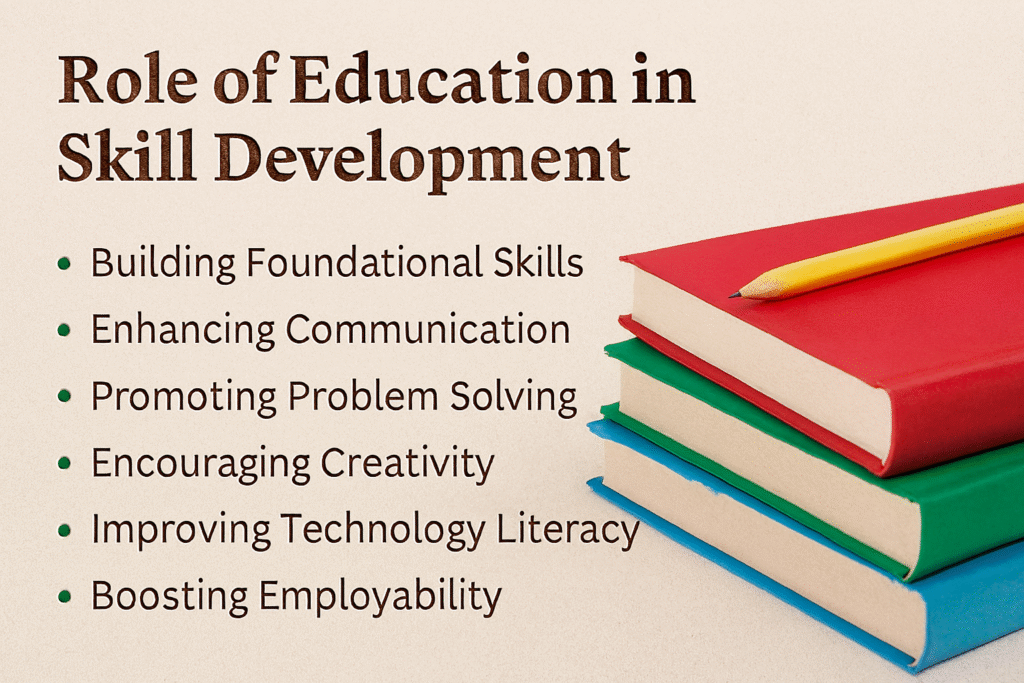
In today’s fast-evolving world, education is no longer just about textbooks and exams — it’s about preparing individuals with the skills they need to thrive. Whether you’re a student aiming for academic success or a professional seeking personal growth, understanding the role of education in skill development is essential. This blog explores how education shapes critical skills, enhances employability, and fosters lifelong learning. At easedu, we believe that true education goes beyond marks — it builds mindsets, capabilities, and confidence. What Is Skill Development? Skill development refers to the process of learning, refining, and applying abilities that are essential for personal, academic, and professional success. These include: Hard skills: Technical abilities like coding, accounting, data analysis, etc. Soft skills: Communication, leadership, teamwork, emotional intelligence Life skills: Time management, adaptability, decision-making, problem-solving CBSE vs ICSE How Education Drives Skill Development 1. Foundation Through Formal Learning From primary school to higher education, academic institutions lay the groundwork for essential skills like literacy, numeracy, and critical thinking. Subjects like math, science, and language build analytical and cognitive abilities. 2. Communication & Collaboration Group projects, presentations, and classroom discussions help students develop interpersonal skills. These are vital for teamwork, leadership, and workplace success. 3. Practical & Vocational Training Modern education systems now integrate vocational courses, internships, and hands-on labs that teach real-world applications — bridging the gap between theory and practice. 4. Critical Thinking & Problem Solving Subjects like mathematics, science, and social studies encourage students to analyze, evaluate, and solve problems — skills that are crucial in every career path. 5. Creativity & Innovation Art, design, and extracurricular activities nurture imagination and innovation. Education helps students think outside the box and express ideas confidently. 6. Digital Literacy & Tech Skills With the rise of online learning and digital tools, students now gain exposure to coding, content creation, and digital communication — preparing them for tech-driven careers. NFAT vs CUET Education & Employability In today’s competitive job market, employers seek candidates who are not just qualified but skilled and adaptable. Education plays a key role in: Enhancing job readiness Improving communication and leadership Building domain-specific expertise Encouraging continuous learning and upskilling Education for Lifelong Learning Skill development doesn’t stop after graduation. Education instills a mindset of curiosity, adaptability, and growth, helping individuals: Learn new technologies Switch careers Start businesses Contribute meaningfully to society National Education Policy (NEP) & Skill Integration India’s NEP 2020 emphasizes skill-based education from early stages. It promotes: Vocational training in schools Coding and digital literacy Multidisciplinary learning Internships and real-world exposure This shift ensures that students are not just exam-ready but life-ready. Final Thoughts Education is the engine — skill development is the fuel. Together, they power personal growth, career success, and societal progress. Whether you’re a student, teacher, or lifelong learner, investing in education means investing in your future. FAQs “Role of Education in Skill Development” 1. What is the role of education in skill development? Education builds foundational, technical, and soft skills that prepare individuals for personal growth, career success, and lifelong learning. 2. How does education improve employability? It equips learners with job-ready skills like communication, problem-solving, and digital literacy — making them more competitive in the workforce. 3. What types of skills are developed through education? Academic, vocational, soft skills (like teamwork), digital skills, and life skills such as time management and adaptability. 4. How does NEP 2020 support skill development in India? NEP 2020 integrates vocational training, coding, internships, and multidisciplinary learning from school level to boost practical skills. 5. Can education help in personal development? Yes. Education fosters confidence, critical thinking, emotional intelligence, and a growth mindset — essential for personal success. 6. Why is skill-based education important today? Because industries demand adaptable, skilled professionals. Skill-based education bridges the gap between academic knowledge and real-world needs. 7. What is the difference between education and skill development? Education is the structured process of learning; skill development is the outcome — the practical abilities gained through that learning. 8. How can students develop skills beyond the classroom? Through internships, online courses, extracurriculars, volunteering, and self-learning platforms like. easeedu
CBSE Class 10 SST Syllabus 2025-26
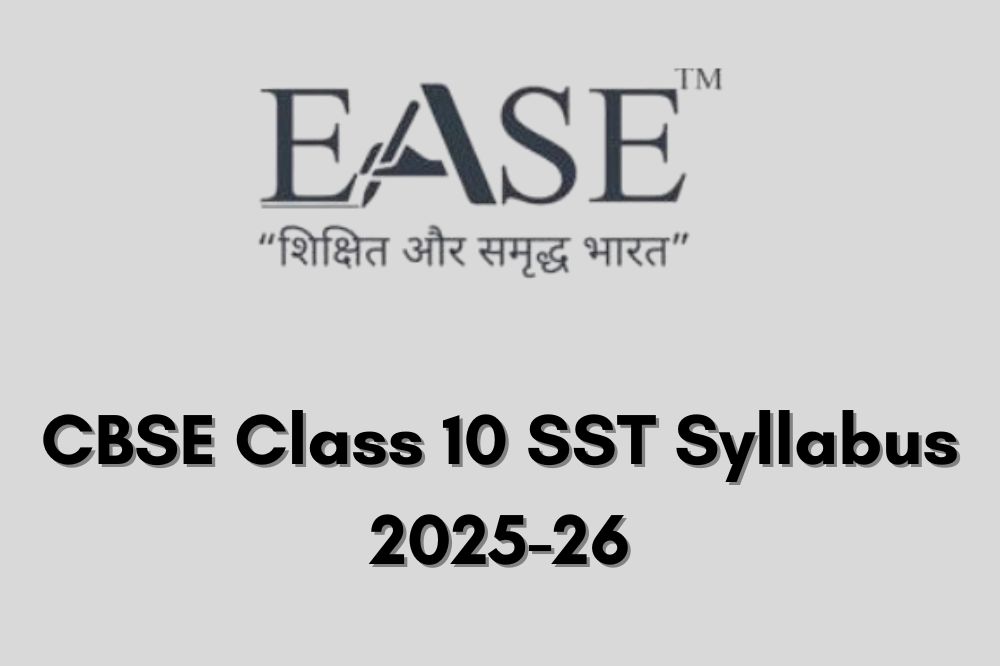
The CBSE Class 10 SST Syllabus 2025-26 is more than just a list of chapters—it’s a roadmap for students preparing for one of the most important academic milestones. With updated topics, competency-based questions, and a renewed focus on application-based learning, this year’s syllabus is designed to build critical thinking, civic awareness, and exam readiness. Whether you’re a student, parent, or educator, understanding the latest SST syllabus helps you plan smarter, revise better, and score higher. CBSE Class 10 SST Syllabus 2025–26: Subject Overview Social Science is divided into four core subjects, each carrying equal weightage in the board exam: Subject Marks (Theory) Internal Assessment Total History 20 — 20 Geography 20 — 20 Political Science 20 — 20 Economics 20 — 20 Internal Assessment — 20 20 Grand Total — — 100 History: India and the Contemporary World – II Chapter 1: The Rise of Nationalism in Europe French Revolution and nationalism Social movements and World War I causes Chapter 2: Nationalism in India Gandhian movements: Khilafat, Non-Cooperation Impact of WWI on India Chapter 3: The Making of a Global World Pre-modern global exchanges Colonialism and globalization (Interdisciplinary project) Chapter 4: The Age of Industrialisation (Periodic Assessment Only) Industrial growth and colonial impact Chapter 5: Print Culture and the Modern World Evolution of print media Impact on society and reform movements Courses After 12th Commerce Courses NIOS vs CBSE Monthly Syllabus for Pre Nursery Class Geography: Contemporary India – II Chapter 1: Resources and Development Land use, soil types, resource planning Chapter 2: Forest and Wildlife Resources Conservation strategies and biodiversity Chapter 3: Water Resources Multipurpose projects and water conservation Chapter 4: Agriculture Types of farming, crop patterns, challenges Chapter 5: Minerals and Energy Resources Conventional vs. non-conventional energy sources Political Science: Democratic Politics – II Chapter 1: Power Sharing Case studies: Belgium and Sri Lanka Chapter 2: Federalism Features of Indian federalism Decentralization Chapter 3: Democracy and Diversity (Periodic Assessment Only) Social divisions and politics Chapter 4: Gender, Religion, and Caste Role of social identities in democracy Chapter 5: Popular Struggles and Movements (Project Work) Case studies of social movements Chapter 6: Political Parties National and regional parties Role in democracy Chapter 7: Outcomes of Democracy Evaluation of democratic systems Economics: Understanding Economic Development Chapter 1: Development Goals of development Income and other indicators Chapter 2: Sectors of the Indian Economy Primary, secondary, tertiary sectors Employment trends Chapter 3: Money and Credit Role of banks Formal and informal credit Chapter 4: Globalisation and the Indian Economy MNCs, trade liberalization, WTO Chapter 5: Consumer Rights (Project Work) Consumer awareness and protection Internal Assessment (20 Marks) Periodic tests Portfolio Subject enrichment activities Interdisciplinary projects Key Highlights of 2025–26 Updates Greater focus on application-based questions Integration of interdisciplinary projects Emphasis on map work in History and Geography Updated case studies and examples in Political Science and Economics 📥 Download the Official CBSE SST Syllabus PDF You can access the full syllabus directly from cbse scademic portal or explore a simplified version on easeedu.in. Dowenload PDF Now Conclusion: CBSE Class 10 SST Syllabus 2025–26 The updated CBSE Class 10 Social Science syllabus for 2025–26 offers a balanced mix of conceptual depth, real-world relevance, and skill-based learning. For students, it’s a chance to build strong foundations in history, civics, geography, and economics. For parents and educators, it’s an opportunity to guide preparation with clarity and confidence. At EaseEdu, we simplify the syllabus into actionable insights—so students don’t just study harder, they study smarter. Whether you’re aiming for top scores or holistic understanding, this syllabus is your starting point—and EaseEdu is your partner every step of the way. Frequently Asked Questions (FAQs) Q1. What is the latest syllabus for CBSE Class 10 Social Science 2025–26? The syllabus includes updated chapters across History, Geography, Political Science, and Economics, aligned with CBSE’s competency-based framework. Q2. Has CBSE removed any chapters from Class 10 SST this year? Yes, CBSE has revised the syllabus. Some chapters have been rationalized or merged. Refer to the official syllabus PDF or our breakdown for details. Q3. What is the unit-wise weightage for Class 10 SST board exam? History: 20 marks, Geography: 20 marks, Political Science: 20 marks, Economics: 20 marks, Map Work: 5 marks. Internal assessment carries 20 marks. Q4. Are there any changes in the exam pattern for SST 2025–26? The paper follows a competency-based format with MCQs, short answers, and case-based questions. Emphasis is on application and analysis. Q5. How can I prepare effectively for Class 10 SST board exam? Focus on NCERT textbooks, solve previous year papers, use mind maps, and practice map work regularly. Our guide includes tips and resources. Q6. Is map work still part of the SST syllabus? Yes, map work is included under Geography and History. It carries 5 marks and is essential for scoring well. Q7. Where can I download the official CBSE Class 10 SST syllabus PDF? You can download it from the CBSE academic website or access it directly through our EaseEdu resource hub.
NFAT Exam Syllabus 2025–26: Download the Latest PDF & Prepare Smarter

If you’re planning to pursue a career in forensic sciences, cyber security, or multimedia forensics, the National Forensic Admission Test (NFAT) is your gateway to top-tier programs at the National Forensic Sciences University (NFSU). To help you ace the exam, we’ve compiled the complete NFAT syllabus for 2025–26, along with direct access to downloadable resources, expert tips, and preparation strategies. What Is NFAT? The NFAT (National Forensic Admission Test) is a university-level entrance exam conducted by NFSU for admission into postgraduate programs such as: M.Sc Forensic Science M.Sc Multimedia Forensics M.Tech Cyber Security PG Diplomas and other specialized courses The exam is held in CBT mode, lasts 90 minutes, and includes multiple-choice questions (MCQs) across science and aptitude domains. NFAT 2025–26 Syllabus Overview Here’s a breakdown of the subject-wise syllabus for key programs: M.Sc Forensic Science Physics: Electrostatics, Wave Optics, Thermodynamics, Gravitation, Oscillatory Motion Chemistry: Organic Chemistry (Alcohols, Aldehydes, Ketones), Coordination Compounds, Electrochemistry Biology: Cell Biology, Biomolecules, Genetics, Immunology Forensic Basics: Crime scene investigation, evidence handling, analytical technique M.Sc Multimedia Forensics Physics, Chemistry, Basic Forensic Science Computer Science & Electronics Logical Reasoning & IT Fundamentals M.Tech Cyber Security Divided into two parts: Technical Aptitude: Networking, OS, Cyber Laws Logical Reasoning & Analytical Skills Download NFAT Syllabus PDF EaseEdu offers a free, direct download of the official NFAT syllabus for 2025–26. No sign-up required—just click and start preparing. 👉 Download NFAT Syllabus PDF How to Prepare Effectively ✅ Practice Previous Year Papers: Understand question trends and difficulty levels ✅ Focus on Core Concepts: Especially in physics, chemistry, and logical reasoning ✅ Use EaseEdu’s Exam-Focused Resources: Curated study guides, mock tests, and expert tips ✅ Stay Updated: Follow NFSU announcements and EaseEdu’s blog for latest changes Final Words Whether you’re aiming for M.Sc Forensic Science or Cyber Security, mastering the NFAT syllabus is your first step. Download the official syllabus, explore our preparation tools, and start your journey with confidence. easeedu
CBSE Class 11 Physics Syllabus 2025–26 | Download PDF + Exam Prep Guide
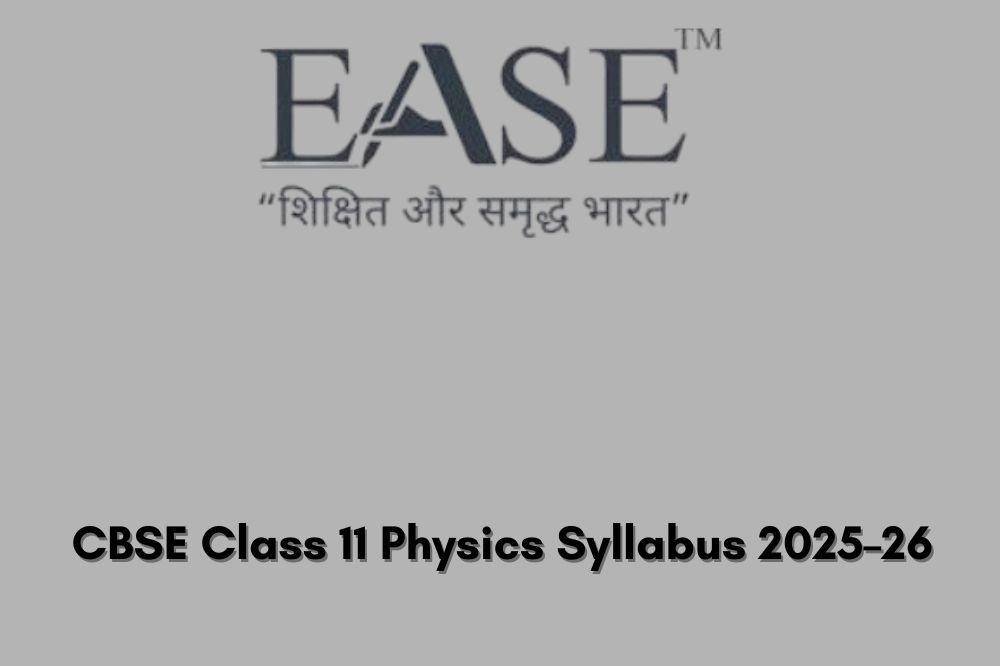
Physics is not just a subject—it’s the foundation of every competitive exam from JEE to NEET, and a gateway to understanding the universe. The CBSE Class 11 Physics Syllabus 2025–26 has been officially released, and EaseEdu brings you the complete syllabus, downloadable PDF, and exam-focused resources to help you stay ahead. Download CBSE Class 11 Physics Syllabus 2025–26 PDF Students can now access the latest CBSE syllabus for Class 11 Physics (2025-26) directly from EaseEdu. This updated curriculum includes: Revised chapter-wise structure Updated marking scheme Competency-based question formats Focus on conceptual clarity and application 👉Download Official syllabus PDF CBSE Class 11 Physics Syllabus 2025–26 – Chapter-Wise Breakdown Unit Chapters Included Marks Unit I Physical World & Measurements 23 Unit II Motion in a Straight Line, Motion in a Plane 23 Unit III Laws of Motion — Unit IV Work, Energy & Power 17 Unit V System of Particles & Rotational Motion 17 Unit VI Gravitation — Unit VII Mechanical Properties of Solids & Fluids, Thermal Properties 20 Unit VIII Thermodynamics — Unit IX Kinetic Theory of Gases — Unit X Oscillations & Waves 10 Total — 70 CBSE Class 11 Syllabus 2025–26 Physics Class 12 Syllabus (2025–26) Courses After 12th Commerce Course This syllabus aligns with international standards, promotes problem-solving skills, and integrates experimental learning Frequently Asked Questions (FAQs) Q1: Where can I download the CBSE Class 11 Physics syllabus 2025–26? 👉 You can download the official PDF from cbse academic portal or directly via EaseEdu. Q2: What is the total marks distribution for Class 11 Physics? 👉 The theory paper is of 70 marks, and the practical/internal assessment carries 30 marks. Q3: Are there any changes in the syllabus this year? 👉 Yes, CBSE has introduced competency-based questions, reduced content overlap, and emphasized application-based learning Q4: Is this syllabus relevant for JEE/NEET preparation? 👉 Absolutely. Class 11 Physics forms the core foundation for competitive exams. EaseEdu’s extra content is aligned with both CBSE and entrance exam formats. Q5: How can I prepare effectively for Class 11 Physics? 👉 Focus on understanding concepts, solving numericals, and revising regularly. Use EaseEdu’s chapter-wise notes, mock tests, and formula sheets for smart preparation. Final Thoughts The CBSE Class 11 Physics Syllabus 2025–26 is your roadmap to mastering the subject and scoring high in exams. With EaseEdu’s curated resources, downloadable syllabus, and exam-focused content, you’re not just preparing—you’re building a strong academic future. Bookmark this page, download the syllabus, and start your Physics journey with clarity and confidence.
Physics Class 12 Syllabus (2025–26) – Download PDF
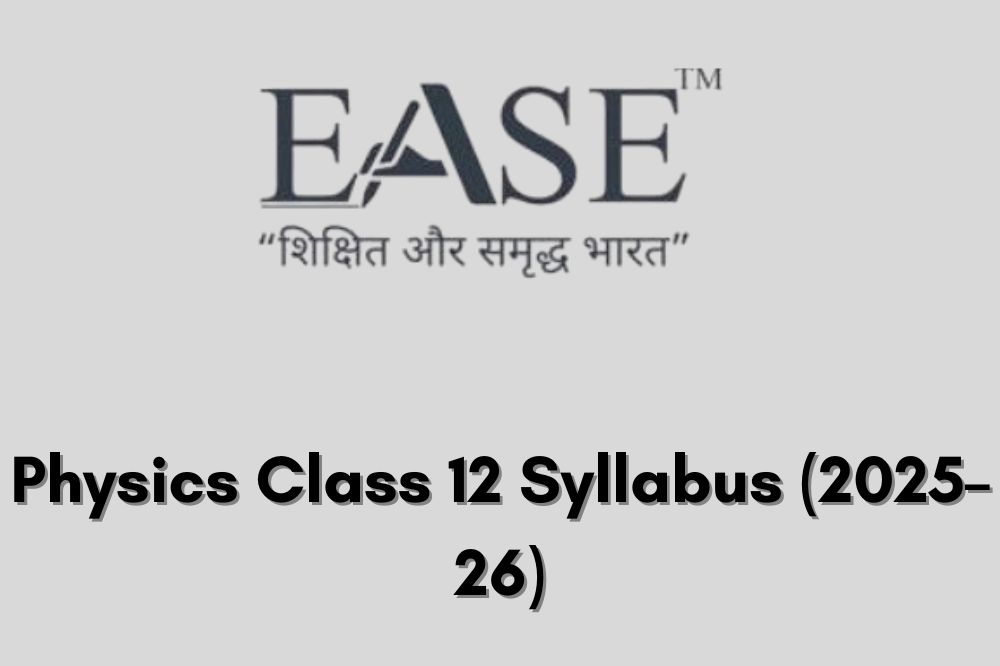
EaseEdu presents the complete and updated CBSE Class 12 Physics syllabus for 2025–26, including unit-wise topics, marking scheme, and a free downloadable PDF. Whether you’re preparing for board exams, JEE, NEET, or Olympiads, this guide ensures you stay ahead. 📘 Why the Physics Syllabus Matters Understanding the syllabus helps students: Focus on high-weightage chapters Align preparation with CBSE guidelines Avoid missing key topics Plan revision and practice strategically 📚 CBSE Class 12 Physics Syllabus – Unit-Wise Breakdown Unit Chapters Marks Unit I: Electrostatics Electric Charges and Fields, Electrostatic Potential and Capacitance 16 Unit II: Current Electricity Current Electricity — Unit III: Magnetic Effects of Current & Magnetism Moving Charges and Magnetism, Magnetism and Matter 17 Unit IV: Electromagnetic Induction & AC Electromagnetic Induction, Alternating Current — Unit V: Electromagnetic Waves Electromagnetic Waves 18 Unit VI: Optics Ray Optics, Wave Optics — Unit VII: Dual Nature of Radiation & Matter Dual Nature of Radiation and Matter 12 Unit VIII: Atoms & Nuclei Atoms, Nuclei — Unit IX: Electronic Devices Semiconductor Electronics 7 Practical Component: Includes experiments, activities, and project work as per CBSE guidelines. Download Class 12 Physics Syllabus PDF EaseEdu provides the official Class 12 Physics syllabus PDF for free. 👉 Dowenload ❓ Frequently Asked Questions (FAQs) 1. How many units are there in Class 12 Physics? There are 9 units covering topics from Electrostatics to Electronic Devices, each with specific chapters and weightage 2. Where can I download the official syllabus PDF? You can download it from the CBSE website or trusted academic platforms like EaseEdu. 3. What is the marking scheme for Class 12 Physics? The theory paper is of 70 marks, and the practical component carries 30 marks, totaling 100 marks. 4. How should I prepare for Class 12 Physics? Start with the syllabus, focus on NCERT chapters, solve previous year papers, and use structured resources like EaseEdu’s chapter guides. 5. Is this syllabus useful for competitive exams? Yes. The Class 12 Physics syllabus forms the foundation for JEE, NEET, CUET, and other entrance exams.
